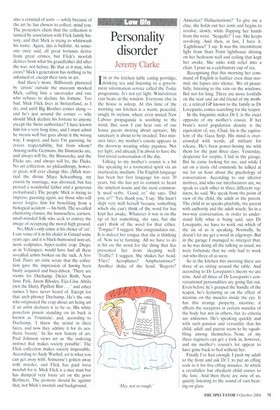Personality disorder
Jeremy Clarke -um at the kitchen table eating porridge, I'm
tea and listening to a government information service called the Today programme. It's not yet light. Wind-driven rain beats at the window. Everyone else in the house is asleep. At this time of the morning our kitchen is a warm, peaceful, snugly lit asylum. where even muted New Labour propaganda is soothing to the mind. But soon I can hear one of our house guests moving about upstairs. My sanctuary is about to be invaded. Two minutes later, my mother's cousin appears in the doorway wearing white pyjamas. Not yet light, and already I'm about to have the first trivial conversation of the day.
Talking to my mother's cousin is a bit like speaking to a tormented spirit via an inarticulate medium. The English language has been her first language for over 70 years, but she has yet to commit to heart the simplest nouns and the most commonly used verbs. 'Good, er,' she says. 'Did you, er?"Yes, thank you,' I say. She hasn't slept very well herself because something which she can't think of the word for has kept her awake. Whatever it was is on the tip of her something, she says, but she can't think of the word for that either. 'Tongue?' I suggest. She congratulates me. It is indeed her tongue that she is thinking of. Now we're farming. All we have to do is hit on the word for the thing that has prevented her from sleeping well. 'Traffic?' I suggest. She shakes her head. 'Flies? Aeroplanes? Amphetamines?' Another shake of the head. 'Regrets? Anxieties? Hallucinations?' To give me a clue, she holds out her arms and begins to revolve, slowly, while flapping her hands from the wrist. 'Seagulls?' I say. She keeps revolving. And then, at last, I have it. 'Lighthouse!' I say. It was the intermittent light from Start Point lighthouse shining on her bedroom wall and ceiling that kept her awake. She sinks with relief into a chair. I pour us a celebratory cup of tea.
Recognising that this morning her command of English is faultier even than normal, she lapses into silence. We sit peacefully, listening to the rain on the windows. But not for long. There are more footfalls on the stair and an old friend of my mother, a retired GP known to the family as Dr Lovepants, comes searching for the teapot.
In the linguistic stakes Dr L is the exact opposite of my mother's cousin. If her brain's word population density is the equivalent of, say, Chad, his is the equivalent of the Gaza Strip. His mind is overcrowded with words, all militant for release. He's been power-hosing me with them for the past three days. Yesterday, desperate for respite. I hid in the garage. But he came looking for me, and while I sat on a dusty old commode he talked at me for an hour about the psychology of conversation. According to our ulterior motives, and who our interlocutors are, we speak to each other in three different registers, he said. We speak from the point of view of the child, the adult or the parent. The child in us speaks playfully, the parent with authority and the adult wisely. So in a two-way conversation, in order to understand fully what is being said, says Dr Lovepants, we have to work out which of the six of us is speaking. Normally, he doesn't let me get a word in edgeways. But in the garage I managed to interject that, as he was doing all the talking as usual, we were fortunate that we only had to work out who three of us were.
So in the kitchen this morning there are three of us sitting around the table. And according to Dr Lovepants's theory we are nine. And all three of Dr Lovepants's conversational personalities are going flat out. Even before he's grasped the handle of the teapot, he's lecturing us on the effect of nicotine on the muscles inside the eye. It has this strange property, nicotine: it affects the receptors in certain muscles of the body but not in others, but its criteria are unknown. He's speaking quickly and with such passion and versatility that his child, adult and parent seem to be squabbling among themselves. None of my three registers can get a look in, however, and my mother's cousin's lot appear to have gone back to bed without her.
Finally I've had enough. I push my adult to the front and ask Dr L to put an effing sock in it for five effing minutes. At which a crestfallen but obedient child comes to the fore. And then there are nine of us, quietly listening to the sound of rain beating on glass.


















































































































 Previous page
Previous page